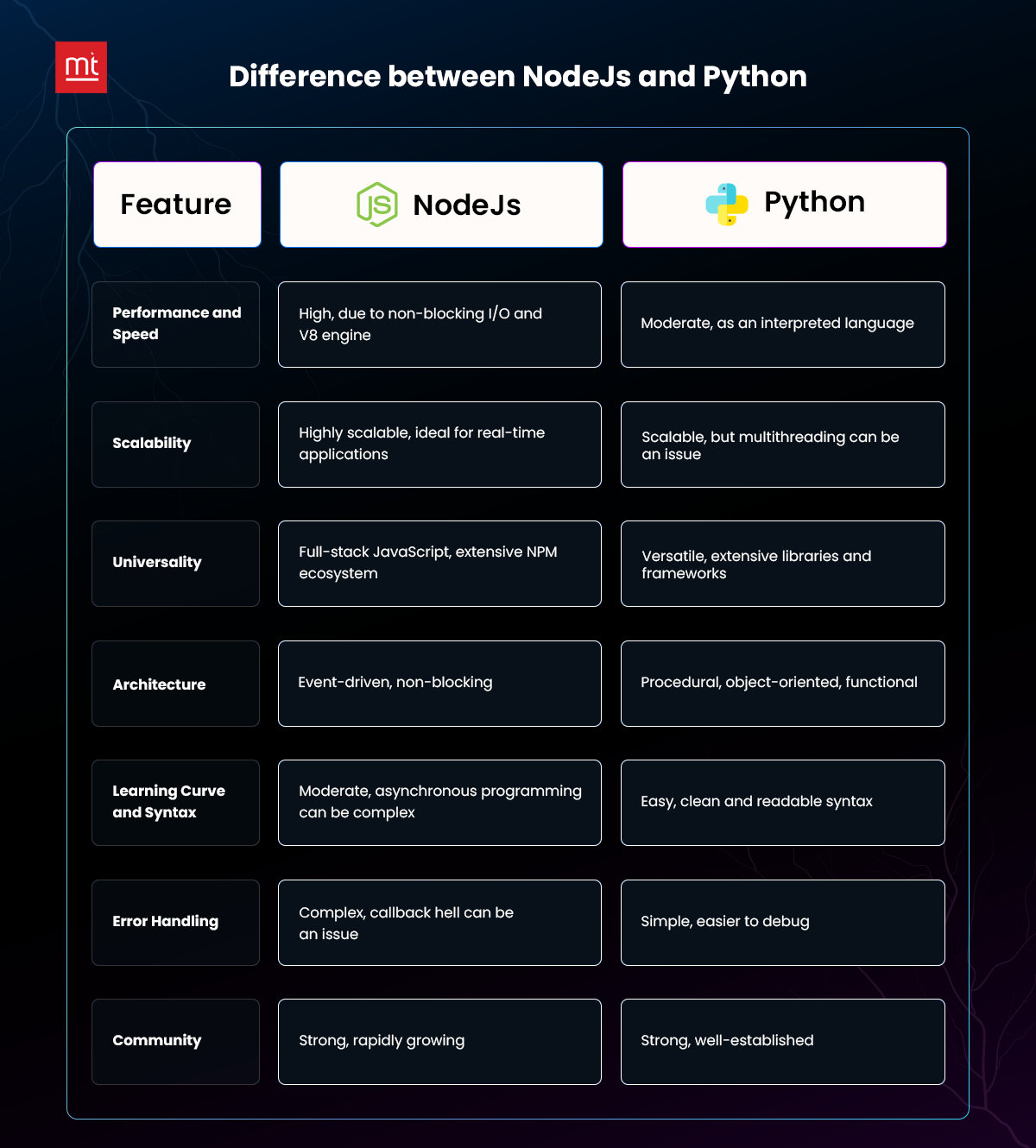Get Free Trial Week Developer Access, Try Before You Hire. Click Here to Claim Now
Introduction:
Web applications need the correct technological stack to succeed in today's changing digital world. Of the many programming languages and frameworks accessible, Node.js vs Python stands out as one of the most often used and flexible ones for backend development. Both technologies offer unique qualities, advantages, and drawbacks that might significantly affect your web application's scalability, general performance, and whole development experience.
Making a wise choice in line with your project's particular requirements and objectives depends on knowing the distinctions between Node.js and Python. According to Statista, Node.js is the 6th most popular programming language.
From performance, scaling capabilities to community support, there are various factors that lethal the battle of best. Keep reading to explore the differences.
What is Node.js?
Designed on Chrome's V8 JavaScript engine, Node.js is a runtime environment for developers to enable server-side JavaScript usage. Often used in web development, Node.js is renowned for its scalability and efficiency.
Key Features of Node.js
Node.js is a recommended tool for developers because of the various characteristics it offers.
- It guarantees lightweight and effective performance by means of an event-driven, non-blocking I/O paradigm, perfect for data-intensive real-time applications.
- Node.js has a large ecosystem with NPM (Node Package Manager), which provides many tools and libraries to ease development.
- It allows full-stack development, allowing JavaScript to be used for server-side and client-side scripting.
Node.js Benefits
- Its non-blocking I/O activities and event-driven design guarantee high speed and scalability.
- It is a great option for use, including real-time updates—chat apps, gaming, and live streaming services.
- Using the same language—JavaScript—throughout the stack helps team cooperate and streamline development.
- By offering ready-made solutions for routine chores, the large NPM library speeds up development even more.
Node.js Cons/Challenges
- Though effective, its asynchronous programming paradigm may result in complicated and difficult-to-maintain code, often called "callback hell."
- Single-threaded Node.js may not be best for CPU-intensive operations.
- Though worker threads are a solution, they complicate the development process.
- The fast development of the JavaScript environment could cause instability and call for ongoing education and adaptation.
What is Python?
Python is often regarded as a high-level, interpreted programming language with simplicity and readability. Web development, data analysis, artificial intelligence, and scientific computing benefit extensively.
Key Features of Python
- Clean and straightforward Python syntax lowers the expenses of software maintenance and software development.
- It supports procedural, object-oriented, and functional programming, among other programming paradigms.
- Python is a flexible tool for various uses as it also boasts an extensive standard library and many outside modules that improve its features.
- Python's memory management and dynamic typing help make development more accessible.
Python Benefits
- Its simplicity of usage and readability, accelerating development and making it accessible to newcomers.
- Its large-scale libraries and frameworks—Django and Flask for web development—allow quick application growth.
- Strong community support and Python's adaptability also guarantee that developers may find tools and answers for almost every issue.
- Python's extensive use in newly developing domains like data science and machine learning qualifies it as a valuable developer ability.
Python Cons/Challenges
- Performance-critical applications may find it concerning since interpreted languages are often slower than compiled languages.
- Python's Global Interpreter Lock (GIL) additionally restricts multi-threading capacity, possibly affecting large concurrency-dependent programs.
- Python's simplicity and dynamic character may sometimes result in runtime problems that are difficult to fix.
Comparison table of Difference between NodeJs and Python

Difference between NodeJs and Python
Here are detailed differences between NodeJs and Python:
1. Performance and Speed
Nodejs vs. python performance differs from Node.js's non-blocking I/O activities and V8 engine, translating JavaScript into machine code, giving it a performance and speed advantage. Node.js is very effective at managing concurrent demands and real-time data processing.
Python is often slower, however, as it's an interpreted language. Although this may not be a significant concern for many mobile applications, performance-critical applications might suffer.
2. Scalability
Applications that must manage many concurrent connections—such as chat apps, online gaming, and live streaming services—have Node.js as their favorite option as it is so scalable. Its event-driven design helps it to control many connections effectively.
Although Python is utilized in many large-scale projects and is scalable, its multi-threading restrictions might be a disadvantage. Although frameworks like Django and Flask provide scalability, developers may have to work especially hard to match Node.js's degree of concurrency.
3. Universality
Node.js lets JavaScript be used for full-stack development, enabling the same language for the front-end and rear-end of an application. This helps nodejs developers work across the whole stack more efficiently and simplifies development.
Python lacks the whole stack capabilities of Node.js, even if it is somewhat flexible and adept at managing both web and non-web chores. Python's universality, therefore, rests on its adaptability for many fields, including web development, data analysis, machine learning, and more.
4. Architecture
Particularly effective for I/O-bound applications, Node.js employs an event-driven, non-blocking design. This design lets Node.js manage many connections simultaneously without becoming mired in sluggish procedures.
Conversely, Python supports functional, object-oriented, and procedural programming, among other programming paradigms. Dedicated Developers who favor or demand a particular programming style might find this adaptability helpful.
5. Learning Curve and Syntax
Python is an excellent option for novices and fast development as its simple syntax and mild learning curve are well-known. Its clarity and simplicity aid in cutting development time and effort.
Node.js, with its asynchronous programming approach, might have a higher learning curve even if it is based on JavaScript, a language most developers know. Controlling promises and callbacks may be difficult, especially for developers fresh to asynchronous programming.
6. Error Handling
Node.js is asynchronous, and error management may be complex. Careful handling of callbacks, promises, and asynchronous/await patterns helps to prevent problems such as callback hell and unmet promise rejections.
On the other hand, Python offers simple error handling using try/except sections, facilitating debugging and code maintenance. Because Python's error handling is so straightforward, maintainable, and dependable codebases result.
7. Group
Strong, vibrant communities in both Node.js and Python provide libraries, tools, and great support. Supported by a strong community that is constantly expanding its environment, Node.js has witnessed fast development.
With a well-established community and many modules and frameworks for a broad spectrum of uses, Python provides excellent community support for both systems and guarantees developers the ability to solve most issues.
Why Choose Manek Tech for App Development?
Manek Tech is one of the best options for your web application's development partner. Manek Tech guarantees that your project is handled with the best knowledge and professionalism using a team of seasoned engineers adept in Node.js development and Python development.
From first planning and design to deployment and maintenance, ManekTech's thorough web development services address every facet of the development lifecycle. ManekTech offers specialized tools catered to your particular requirements, whether you demand a difference between Node.js and Python developers.
Conclusion
Your project's particular needs will determine whether Node.js or Python is best. Perfect for real-time applications and high-concurrency systems, Node.js shines in performance, scalability, and full-stack development. Rapid development and applications incorporating data analysis and machine learning fit Python's simplicity, adaptability, and low learning curve.
Recent Blogs
Subscribe to Our Newsletter!
Join us to stay updated with our latest blog updates, marketing tips, service tips, trends, news and announcements!





















